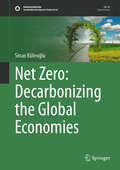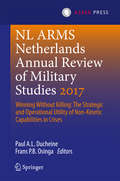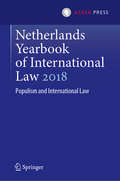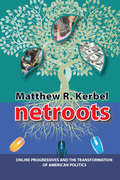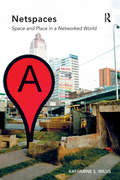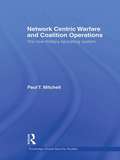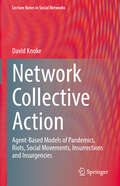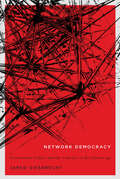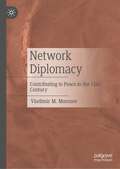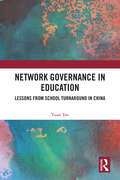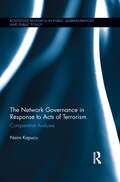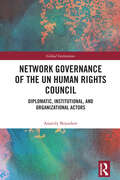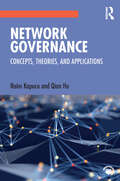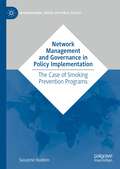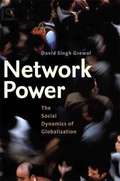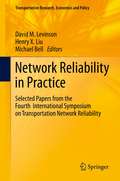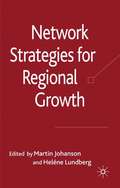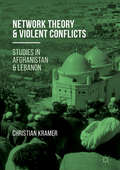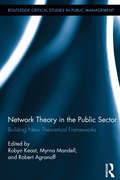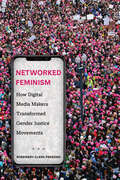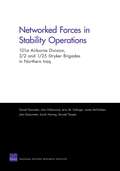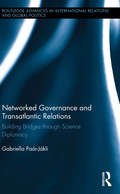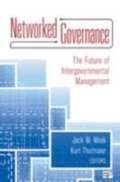- Table View
- List View
Net Zero: Decarbonizing the Global Economies (Sustainable Development Goals Series)
by Sinan KüfeoğluThis monograph is designed to provide a comprehensive and accessible reference to Net Zero efforts globally. Firstly, the book explains the basics of Net Zero, Greenhouse Gas Emissions (GHG), and the global climate change struggle. A chapter on Environmental, Social, and Governance (ESG), as standardisation and screening of sustainability follows. Next comes a chapter on carbon pricing and carbon tax. After these background chapters, the book continues with eight chapters that cover Net Zero across a variety of economic sectors: energy supply, business sector, transport, residential, industrial processes, waste management, public (and government), and agriculture, forestry and land use. These economic sectors are adopted from the Intergovernmental Panel on Climate Change (IPCC) and UK National Statistics. Each chapter includes basic background information, technical or scientific, and a policy section. The sector-based chapters also include sectoral emissions analysis, review, and then a horizon scanning for innovative companies and their business models. This will enable non-experts from the business sector to read and understand the dynamics and trends in other sectors. Similarly, students and fresh graduates will easily follow the chapter (or the industry) that interests them and comprehend the basics and contemporary business trends. By joining research work with the business models of 400 noteworthy and innovative companies, this book constructs a vital bridge between academia, practical reality, policy, and business implementation, with a keen focus on environmental value.
Netherlands Annual Review of Military Studies 2017
by Paul A.L. Ducheine Frans P.B. OsingaInternational conflict resolution increasingly involves the use of non-military power and non-kinetic capabilities alongside military capabilities in the face of hybrid threats. In this book, counter-measures to those threats are addressed by academics with both practical and theoretical experience and knowledge, providing strategic and operational insights into non-kinetic conflict resolution and on the use of power to influence, affect, deter or coerce states and non-state actors. This volume in the NL ARMS series deals with the non-kinetic capabilities to address international crises and conflicts and as always views matters from a global perspective. Included are chapters on the promise, practice and challenges of non-kinetic instruments of power, the instrumentality of soft power, information as a power instrument and manoeuvring in the information environment, Russia's use of deception and misinformation in conflict, applying counter-marketing techniques to fight ISIL, using statistics to profile terrorists, and employing tools such as Actor and Audience Analysis. Such diverse subjects as lawfare, the Law of Armed Conflict rules for non-kinetic cyber attacks, navigation warfare, GPS-spoofing, maritime interception operations, and finally, as a prerequisite, innovative ways for intelligence collection in UN Peacekeeping in Mali come up for discussion. The book will provide both professionals such as (foreign) policy makers and those active in the military services, academics at a master level and those with an interest in military law and the law of armed conflict with useful and up-to-date insights into the wide range of subjects that are contained within it. Paul A.L. Ducheine and Frans P.B. Osinga are General Officers and full professors at the Faculty of Military Sciences of the Netherlands Defence Academy in Breda, The Netherlands.
Netherlands Yearbook of International Law 2018: Populism and International Law (Netherlands Yearbook of International Law #49)
by Janne E. Nijman Wouter G. WernerThis volume of the Netherlands Yearbook of International Law explores the many faces of populism, and the different manifestations of the relationship between populism and international law. Rather than taking the so-called populist backlash against globalisation, international law and governance at face value, this volume aims to dig deeper and wonders ‘What backlash are we talking about, really?’. While populism is contextual and contingent on the society in which it arises and its relationship with international law and institutions thus has differed likewise, this volume assists in our examination of what we find so dangerous about populism and problematic in its relationship with international law.The Netherlands Yearbook of International Law was first published in 1970. It offers a forum for the publication of scholarly articles in a varying thematic area of public international law.
Netroots: Online Progressives and the Transformation of American Politics (Media and Power)
by Matthew Robert KerbelThe progressive "netroots," fueled by bloggers writing on websites like the Daily Kos and working through online organizations like MoveOn, are on the verge of spearheading a revolution that may well define the coming political era. Still, their purpose, goals, and track record remain largely misunderstood. This book provides an understanding of the loosely affiliated groups that collectively call themselves the progressive netroots: who they are, what they hope to accomplish, what they've done so far and how likely it is they will succeed in a plan so audacious it would result, if realized, in the transformation of America from a television-focused, center-right nation to an Internet-focused, center-left nation. Netroots weaves together a range of evidence and arguments to shatter conventional myths about this online movement. It explains why the left is better positioned than the right to take advantage of the decentralized nature of the Internet. As progressive candidates make uneven progress toward winning elections, the progressive netroots are working to drive media narratives and building real and virtual communities of activists that will contribute strongly to electoral success. Netroots documents the achievements of this emerging political force through an engaging analysis told with an eye toward history and in the bloggers' own words.
Netspaces: Space and Place in a Networked World
by Katharine S. WillisThe focus of this book is on understanding and explaining the way that our increasingly networked world impacts on the legibility of cities; that is how we experience and inhabit urban space. It reflects on the nature of the spatial effects of the networked and mediated world; from mobile phones and satnavs to data centres and wifi nodes and discusses how these change the very nature of urban space. It proposes that netspaces are the spaces that emerge at the interchange between the built world and the space of the network. It aims to be a timely volume for both architectural, urban design and media practitioners in understanding and working with the fundamental changes in built space due to the ubiquity of networks and media. This book argues that there needs to be a much better understanding of how networks affect the way we inhabit urban space. The volume defines five characteristics of netspaces and defines in detail the way that the spatial form of the city is affected by changing practices of networked world. It draws on theoretical approaches and contextualises the discussion with empirical case studies to illustrate the changes taking place in urban space. This readable and engaging text will be a valuable resource for architects, urban designers, planners and sociologists for understanding how of networks and media are creating significant changes to urban space and the resulting implications for the design of cities.
Network Centric Warfare and Coalition Operations: The New Military Operating System (Routledge Global Security Studies)
by Paul T. MitchellThis book argues that Network Centric Warfare (NCW) influences how developed militaries operate in the same fashion that an operating system influences the development of computer software. It examines three inter-related issues: the overwhelming military power of the United States; the growing influence of NCW on military thinking; and the centrality of coalition operations in modern military endeavours. Irrespective of terrorist threats and local insurgencies, the present international structure is remarkably stable - none of the major powers seeks to alter the system from its present liberal character, as demonstrated by the lack of a military response to US military primacy. This primacy privileges the American military doctrine and thus the importance of NCW, which promises a future of rapid, precise, and highly efficient operations, but also a future predicated on the ‘digitization’ of the battle space. Participation in future American-led military endeavours will require coalition partners to be networked: ‘interoperability’ will therefore be a key consideration of a partner’s strategic worth. Network Centric Warfare and Coalition Operations will be of great interest to students of strategic studies, international security, US foreign policy and international relations in general.
Network Collective Action: Agent-Based Models of Pandemics, Riots, Social Movements, Insurrections and Insurgencies (Lecture Notes in Social Networks)
by David KnokeCollective action asks a fundamental question in social science: How do sets of actorschoose courses of action and work together to achieve desired outcomes, often inopposition to other coalitions? Psychological and economic rationality explanations areincomplete in emphasizing the mental decision processes of individuals. Collectiveaction must be understood at the level analysis of interpersonal and interorganizationalrelations. Social network theories and methods provide optimal frameworks forexplaining collective action in a variety of settings. This book reviews theories andempirical research on collective action in several substantive areas, demonstrates howagent-based models can analyze collective action networks (pandemics, riots, socialmovements, insurrections, insurgencies), and concludes with speculations about futureresearch directions.
Network Democracy: Conservative Politics and the Violence of the Liberal Age
by Jared GiesbrechtNetwork Democracy uses the contemporary tools of ecology and network thinking to unearth the ancient, intellectual ruins of traditional conservative thought. Questioning the West’s veneration of freedom, equality, contractual citizenship, economic progress, cosmopolitanism, secular institutionalism, and reason, Jared Giesbrecht illuminates how these ideals fuel violence and insecurity in our high-speed lives. While the modern age witnesses the rise of a violent conservatism in the form of revolutionary movements enacting terror and vengeance for the interventions of the liberal West, this study reveals a different kind of conservatism - one that has emerged in direct conversation with liberal thought. Giesbrecht highlights the need for intermediate institutions and civil enterprises that form relations and traditions independent of the state in order to develop resistance to the insecurity of the liberal age. This book offers not only a poignant critique, but a constructive and peaceable alternative to the violence of both liberalism and reactionary anti-liberalism. Attuned to the new realities of globalization, advanced technology, and social acceleration, Network Democracy is a masterful hybrid of ancient and cutting-edge political philosophy that casts a new light on the values underlying western civilization.
Network Democracy: Conservative Politics and the Violence of the Liberal Age (McGill-Queen's Studies in the History of Ideas #107)
by Jared GiesbrechtNetwork Democracy uses the contemporary tools of ecology and network thinking to unearth the ancient, intellectual ruins of traditional conservative thought. Questioning the West’s veneration of freedom, equality, contractual citizenship, economic progress, cosmopolitanism, secular institutionalism, and reason, Jared Giesbrecht illuminates how these ideals fuel violence and insecurity in our high-speed lives. While the modern age witnesses the rise of a violent conservatism in the form of revolutionary movements enacting terror and vengeance for the interventions of the liberal West, this study reveals a different kind of conservatism - one that has emerged in direct conversation with liberal thought. Giesbrecht highlights the need for intermediate institutions and civil enterprises that form relations and traditions independent of the state in order to develop resistance to the insecurity of the liberal age. This book offers not only a poignant critique, but a constructive and peaceable alternative to the violence of both liberalism and reactionary anti-liberalism. Attuned to the new realities of globalization, advanced technology, and social acceleration, Network Democracy is a masterful hybrid of ancient and cutting-edge political philosophy that casts a new light on the values underlying western civilization.
Network Diplomacy: Contributing to Peace in the 21st Century
by Vladimir M. MorozovThe current monograph is the result of many years of work by the author in the field of the understudied concept of network diplomacy and the possibilities of using it in resolving sharp conflicts in order to facilitate their more effective resolution, as well as the possibilities of using the elements of network diplomacy in peaceful spheres of world politics, business and private sector. The main part of the book consists of case-studies that are dedicated to the possible use of network diplomacy in "problem" zones (the Libyan crisis, the conflict in Syria, the Palestinian-Israeli conflict, the armed conflict in Nagorno-Karabakh), as well as in areas of peaceful coexistence (international sport, culture and humanitarian ties, twin cities, cross years etc). Some chapters are particularly dedicated to Russia’s possible involvement in network solutions to the conflicts. This study will offer insights into how Russian diplomats are hoping to build a new peace today.
Network Governance in Education: Lessons from School Turnaround in China
by Yuan TaoThis book explores and theorizes the complexity of network governance in school turnaround in China, drawing on an interpretive qualitative paradigm.School turnaround provides a useful perspective for understanding network governance in education, as it involves interactions among multiple parties of actors all aiming to improve school quality. Based on a case study of three school turnaround networks in Shanghai, this book analyzes the complexity of interactions among schools, local governments, and third-party actors. The study goes beyond a simple description of the plurality of state and non-state actors involved in education. It places particular emphasis on the power of network actors and the power dynamics among them that shape their interactions and positions in educational governance. The power perspective adopted in this book provides insight into which network actors matter in education governance and how network governance should be applied in education, particularly in school turnaround.The book will appeal to scholars and students of education and will be particularly useful to policymakers and practitioners interested in educational administration, management and leadership, educational improvement, and Chinese education.
Network Governance in Response to Acts of Terrorism: Comparative Analyses (Routledge Research in Public Administration and Public Policy)
by Naim KapucuHigh performance during catastrophic terrorist events require the ability to assess and adapt capacity rapidly, restore or enhance disrupted or inadequate communications, utilize flexible decision making swiftly, and expand coordination and trust between multiple emergency and crisis response agencies. These requirements are superimposed on conventional administrative systems that rely on relatively rigid plans, decision protocols, and formal relationships that assume smooth sailing and uninterrupted communications and coordination. Network Governance in Response to Acts of Terrorism focuses on the inter-organizational performance and coordinated response to recent terrorist incidents across different national, legal, and cultural contexts in New York, Bali, Istanbul, Madrid, London, and Mumbai. Effortlessly combining each case study with content analyses of news reports from local and national newspapers, situation reports from government emergency/crisis management agencies, and, interviews with public managers, community leaders, and nonprofit executives involved in response operations, Naim Kapucu presents an overview of how different countries tackle emergencies by employing various collaborative decision-making processes, thus, offering a global perspective with different approaches. These features make this book an important read for both scholars and practitioners eager to reconcile existing decision-making theories with practice.
Network Governance of the UN Human Rights Council: Diplomatic, Institutional, and Organizational Actors (Global Institutions)
by Anatoly BoyashovThis book explores how the structures of international organizations have become increasingly complex and considers why states choose to become part of networks of international organizations alongside non-state actors. While granting participation rights to non-state actors, states have been actively involved in establishing complex ties with them. International organizations, in their turn, have enhanced the sustainment of complex networks. The author argues that the involvement in networks of international organizations provides better capacities in communication. Thus, being a governmental or non-governmental entity, an actor tends to occupy the beneficial structural positions of a leader, connecting to as many actors as possible; or a broker bridging isolated subgroups within a network. Through a study of the UN Human Rights Council (HRC) and the respective diplomatic, institutional, and organizational networks that participate in it, he explores the most visible stakeholders, the institutional setting of the HRC, and the multilateral negotiations on the prevention of human rights violations in 2010-2019. The volume will appeal to scholars, students and practitioners interested in the international organisations, networks, foreign policy, the United Nations and the Human Rights Council.
Network Governance: Concepts, Theories, and Applications
by Naim Kapucu Qian HuNetwork governance has received much attention within the fields of public administration and policy in recent years, but surprisingly few books are designed specifically to help students, researchers, and practitioners examine key concepts, synthesize the growing body of literature into reliable frameworks, and to bridge the theory-practice gap by exploring network applications. Network Governance: Concepts, Theories, and Applications is the first textbook to focus on interorganizational networks and network governance from the perspective of public policy and administration, asking important questions such as: How are networks designed and developed? How are they governed, and what type of leadership do they require? To whom are networks accountable, and when are they effective? How can network governance contribute to effective delivery of public services and policy implementation? In this timely new book, authors Naim Kapucu and Qian Hu define and examine key concepts, propose exciting new theoretical frameworks to synthetize the fast-growing body of network research in public policy and administration, and provide detailed discussion of applications. Network Governance offers not only a much-needed systematic examination of existing knowledge, but it also goes much further than existing books by discussing the applications of networks in a wide range of management practice and policy domains—including natural resource management, environmental protection, public health, emergency and crisis management, law enforcement, transportation, and community and economic development. Chapters include understudied network research topics such as power and decision-making in interorganizational networks, virtual networks, global networks, and network analysis applications. What sets this book apart is the introduction of social network analysis and coverage of applications of social network analysis in the policy and management domains. PowerPoint slides and a sample syllabus are available for adopters on an accompanying website. Drawing on literature from sociology, policy sciences, organizational studies, and economics, this textbook will be required reading for courses on network governance, collaborative public management, cross-sector governance, and collaboration and partnerships in programs of public administration, public affairs, and public policy.
Network Management and Governance in Policy Implementation: The Case of Smoking Prevention Programs (International Series on Public Policy)
by Susanne HadornThis book assesses the management and performance of networks in light of the rising popularity of collaborative approaches in public service delivery. It does so by examining the case of smoking-prevention networks in Switzerland. The book considers how network managers can be distinguished based on work-context related factors, and analyses how the interaction of these factors leads to either active or non-active network management within collaborative policy delivery arrangements. It also empirically investigates the effects that network management and other network-level and project-level factors have on the policy output performance of these networks. Adopting a multi-method approach combining a qualitative comparative analysis, case studies as well as Bayesian regressions, the book will appeal to academics and students of public policy, public administration, and public management. It will also be of use to practitioners responsible for the design and the management of policy delivery networks.
Network Power: The Social Dynamics of Globalization
by David Singh GrewalFor all the attention globalization has received in recent years, little consensus has emerged concerning how best to understand it. For some, it is the happy product of free and rational choices; for others, it is the unfortunate outcome of impersonal forces beyond our control. It is in turn celebrated for the opportunities it affords and criticized for the inequalities in wealth and power it generates. David Singh Grewal's remarkable and ambitious book draws on several centuries of political and social thought to show how globalization is best understood in terms of a power inherent in social relations, which he calls network power. Using this framework, he demonstrates how our standards of social coordination both gain in value the more they are used and undermine the viability of alternative forms of cooperation. A wide range of examples are discussed, from the spread of English and the gold standard to the success of Microsoft and the operation of the World Trade Organization, to illustrate how global standards arise and falter. The idea of network power supplies a coherent set of terms and concepts--applicable to individuals, businesses, and countries alike--through which we can describe the processes of globalization as both free and forced. The result is a sophisticated and novel account of how globalization, and politics, work.
Network Reliability in Practice
by Michael Bell David M. Levinson Henry X. LiuThis book contains selected peer-reviewed papers that were presented at the Fourth International Symposium on Transportation Network Reliability (INSTR) Conference held at the University of Minnesota July 22-23, 2010. International scholars, from a variety of disciplines--engineering, economics, geography, planning and transportation--offer varying perspectives on modeling and analysis of the reliability of transportation networks in order to illustrate both vulnerability to day-to-day and unpredictability variability and risk in travel, and demonstrates strategies for addressing those issues. The scope of the chapters includes all aspects of analysis and design to improve network reliability, specifically user perception of unreliability of public transport, public policy and reliability of travel times, the valuation and economics of reliability, network reliability modeling and estimation, travel behavior and vehicle routing under uncertainty, and risk evaluation and management for transportation networks. The book combines new methodologies and state of the art practice to model and address questions of network unreliability, making it of interest to both academics in transportation and engineering as well as policy-makers and practitioners.
Network Strategies for Regional Growth
by Martin Johanson Heléne LundbergIn many regions the current focus of the state is to initiate and stimulate the emergence of inter-firm networks in order to produce growth. This book takes a management perspective on the operations and processes in these networks and describes and analyzes how and why geographical proximity influences inter-firm networks.
Network Theory and Violent Conflicts
by Christian R. KramerThis book offers a novel approach to understanding violence and violent conflict using complexity and network theories, borrowed from the natural sciences, together with social network analysis. Because violence is both a universal and central component of human communication and identity formation, it has a fundamental function in shaping social behavior. Using Manuel Castells' work on the programming of social networks, this book explores the Lebanese Civil War and the ongoing war in Afghanistan under the perspective of violence within networks. The approach presents a unique and compelling argument that counters the long-held assumption that war is caused by specific events, or is the unavoidable culmination of existing conditions or grievances. Rather, this book argues that violence emerges when the structure of social networks becomes too rigid and hierarchic to adapt to stresses and challenges that materialize on a constant basis from both within and without the network. This is important not only for the study of war, but as a method of improving the success of contemporary peace building efforts.
Network Theory in the Public Sector: Building New Theoretical Frameworks (Routledge Critical Studies in Public Management)
by Robyn Keast Myrna Mandell Robert AgranoffNetworks have been described in terms of metaphors, governance arrangements and structural or institutional arrangements. These different perspectives of networks come out of a variety of disciplines, including political science, public administration, urban affairs, social welfare, public management and organizational/sociological research. This wealth of research, while contributing to a deeper understanding of networks, presents a dilemma which is addressed by this book. That is the question of whether there is a theory of public networks that informs networks in their various forms, and is there a need for a new theory of networks? More importantly, is network research still relevant to practice? Does network theory improve the process of governance? Are different terms and/or approaches actually the same or different? What do these different approaches mean to theory? This book deeply explores and integrates existing network theory and related theories from a number of perspectives, levels and jurisdictions to develop a framework to guide network design, governance and management. The book focuses on the important issue of network performance, looking at networks as bounded and consciously arranged; the actors who participate in them design the relationships among a bounded set of individual organizations to purse common objectives. Finally, the chapters tease out the variety of governance modes or regimes that intersect with network governance. This book offers a comprehensive, integrative, interdisciplinary approach that enables specialists, practitioners and administrators across a wide array of interests and fields to formulate and work on problems using a common language, analytical framework and theoretical basis.
Network of Lies: The Epic Saga of Fox News, Donald Trump, and the Battle for American Democracy
by Brian StelterFox News paid almost a billion dollars in legal settlements to bury the contents of this &“essential…grinding, momentum-building&” (The New York Times) account of the network&’s blatant attempts to manipulate the truth, mislead the public, and influence our elections—from the New York Times bestselling author of Hoax.The ongoing criminal trials of Donald Trump are also a trial for the nation he once led. We are undergoing a stress test of American democracy, the rule of law, and the very notion of a shared political reality. Can we achieve accountability for premeditated assaults on democracy and what forms should accountability take? In Network of Lies, New York Times bestselling author Brian Stelter answers these questions by weaving together private texts, unpublished emails, depositions, and other primary sources to tell the chilling story of Trump&’s alleged conspiracy to steal the 2020 election, and the right-wing media&’s mission to put him back in office in 2024. Trump couldn&’t have convinced millions of Americans of the Big Lie without Fox News. From the moment Joe Biden became president-elect in 2020, Fox hosts fueled a fire of misinformation and violence by spreading Trump&’s tales of election fraud and suppressing the truth. Come January, Sean Hannity insisted Trump needed to stop listening to &“crazy people&” who swore he could stay in power, but it was too late—thousands of Trump&’s deluded followers had stormed the Capitol and Trump operatives had breached Dominion Voting Systems&’ voting machines in Georgia. Now, the 2020 lies are at the center of numerous indictments and his reelection campaign, but Trump is not the only one under fire. The once-untouchable Rupert Murdoch has been held accountable. Dominion&’s legal war, chronicled in-depth for the first time here, revealed that the ninety-two-year-old Fox chairman knew Trump&’s lies were dangerous but he allowed the lies to fill Fox&’s airwaves because, as his &“pain sponge&” Suzanne Scott admitted, telling the truth was &“bad for business.&” Network of Lies goes inside the chat rooms, board rooms, and court rooms where the pro-Trump media&’s greed and selfishness were exposed. Featuring Stelter&’s &“thorough and damning&” (The New York Times) investigative prowess and direct quotations so shocking they read like fiction, Network of Lies is the definitive origin story of Trump&’s attempt to tear down the guardrails of American democracy, and an urgent plea to learn from past mistakes as we head into 2024&’s pivotal presidential election.
Networked Feminism: How Digital Media Makers Transformed Gender Justice Movements
by Rosemary Clark-ParsonsNetworked Feminism tells the story of how activists have used media to reconfigure what feminist politics and organizing look like in the United States. Drawing on years spent participating in grassroots communities and observing viral campaigns, Rosemary Clark-Parsons argues that feminists engage in a do-it-ourselves feminism characterized by the use of everyday media technologies. Faced with an electoral system and a history of collective organizing that have failed to address complex systems of oppression, do-it-ourselves feminists do not rely on political organizations, institutions, or authorities. Instead, they use digital networks to build movements that reflect their values and meet the challenges of the current moment, all the while juggling the advantages and limitations of their media tools. Through its practitioner-centered approach, this book sheds light on feminist media activists' shared struggles and best practices at a time when collective organizing for social justice has become more important than ever.
Networked Forces in Stability Operations: 101st Airborne Division, 3/2 and 1/25 Stryker Brigades in Northern Iraq
by Jerry M. Sollinger John Hollywood Daniel Gonzales James Mcfadden John DejarnetteCompares three units that conducted stability operations in the same area in northern Iraq-the 101st Airborne Division (which had only limited digital communications), the 3/2 Stryker brigade combat team (SBCT), and the 1/25 SBCT (both equipped with digital networks) and finds that leadership, training, and tactics and procedures are just as important as networking capabilities for improving mission effectiveness in stability operations.
Networked Governance and Transatlantic Relations: Building Bridges through Science Diplomacy (Routledge Advances in International Relations and Global Politics)
by Gabriella Paar-JakliIn today’s complex and interconnected world, scholars of international relations seek to better understand challenges spurred by intensified global communication and interaction. The complex connectedness of modern society and politics compels us to investigate the pattern of interconnections among actors who inhabit social and political spaces. Gabriella Paár-Jákli's study aims to advance theory and practice by examining the networks used by specialists in North America and Europe to achieve their policy goals in the area of science and technology. Her book suggests that to overcome policy problems transnationally, three critical factors should be considered. First, as science and technology policy becomes increasingly critical to resolving global issues, it should be regarded as an integral element of the foreign policy process. Second, as liberal international relations theory argues, the increasing role of NGOs must be taken seriously alongside states as vital agents of policy reform. Third, as transatlantic relations remain center to maintaining the global order, they must be reconsidered. Paar-Jakli assesses the role of digital networks as facilitators of regional cooperation. Utilizing various techniques of social network analysis, her research indicates an active and structurally discernible network in cyberspace among transatlantic organizations, and demonstrates the role of virtual networks as facilitators of cooperative arrangements in transatlantic relations. Paár-Jákli's original research uses social network analysis to investigate transatlantic cooperation, a new approach that will be noteworthy to network and transatlantic scholars as well as policymakers.
Networked Governance: The Future Of Intergovernmental Management
by Jack W. Meek Kurt ThurmaierIn this unique contributed volume that features chapters written by top scholars paired with practitioner responses, students can see just how much the landscape of intergovernmental relations has evolved in recent years, with diminishing vertical flows of resources, and increased horizontal flows in the form of cross-jurisdictional and interlocal collaboration. Government at all levels must respond to increasing demands in both of these dimensions giving these contributors plenty to say about the future of intergovernmental management in such areas as: #65533; the changing role of managers, #65533; disaster response, #65533; social welfare spending, #65533; cross-boundary management, #65533; regional public-private partnerships, and #65533; sustainable cities. Contributors include Robert Agranoff, J. Edwin Benton, Beverly A. Cigler, Brian K. Collins, Mauricio Covarrubias, Raymond W. Cox II, John Kincaid, Christopher Koliba, William Lester, David Y. Miller, Beryl A. Radin, Juan M. Romero, and Eric S. Zeemering.
